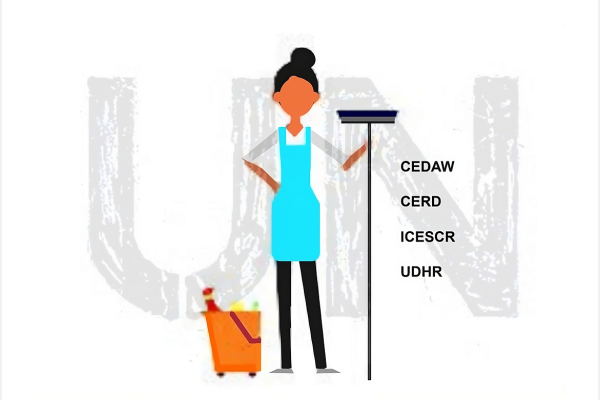Repository of Practices

Engaging United Nations Treaty Bodies on Worker Rights
Secondary GCM Objectives
Dates
Geographic scope
Geographic Scope:
Summary
Domestic Worker Rights coalitions have submitted alternate reports to the United Nations Treaty Bodies reviewing particular countries, which identify violations of human rights treaties, experienced by domestic workers under the Convention on Elimination of all Forms of Discrimination against Women (CEDAW), the Convention on Elimination of Racial Discrimination (CERD) the International Covenant on Economic, Social and Cultural Rights (ICESCR), all of which protect the civil and collective labour rights of “everyone” and are therefore not restricted by employment status or migration status. The reports have highlighted the intersectional discrimination experienced by migrant domestic workers in particular countries, and gaps in both formal laws and implementation of those laws. Since these workers tend to be live-in, the issues of privacy, freedom from violence and harassment, freedom of movement, and minimum standards of housing, are brought to the fore. The submissions are supplemented with written statements, and participation (virtually or in person) in briefings with UN Committee members. In these private briefings, the migrant worker associations have directly addressed Committee members to highlight priority issues and answer questions based on the facts on the ground. These briefings offer an alternate description that that offered by particular states, on challenges to realization of rights. These briefings inform the questions posed by the committees the country being reviewed, in the high level UN dialogue. Consequently, representative country delegates are compelled to publicly respond to difficult questions on the ways in which they are complying with treaty obligations with respect to domestic worker rights. These engagements are primary examples of grassroots internationalism that have proved effective in identifying and refining the challenges faced by domestic workers and ensure that the interpretation of particularly rights is responsive and reflective of domestic and migrant workers experience.
Organizations
Main Implementing Organization(s)
Detailed Information
Partner/Donor Organizations
Benefit and Impact
Under the review of Zimbabwe (2022),CERD recommended that Zimbabwe address discrimination on intersection grounds of race, class and gender and provide domestic workers with mechanisms to claim rights through collective bargaining. It also recommended that they include domestic workers a minimum wage at a level that guarantees them a living wage equal to other workers, and more broadly that informal workers be included in labour law protection. One recent impact of this recommendation is recent litigation launched by the domestic worker union challenging the exclusion of domestic workers from workers compensation.
In a review of Lesotho under ICCPR (2023) the Committee recommended that labour inspectors be permitted to inspect private homes and inspect the situation of children employed as live-in domestic workers. Lesotho recently amended its labour law to address these issues.
In a review of Qatar under CERD (2024), the Committee recommended Qatar address direct, indirect and structural discrimination as well racial discrimination against non-nationals, particularly those from South Asia and sub-Saharan Africa. It recommended Qatar abolish the exit permit requirement entirely and ensure timely wage payments. It found female migrant domestic workers often face harsh working conditions including physical, verbal, and sexual assault and recommended accessible mechanisms for them to report violations without fear of retaliation.
Key Lessons
Recommendations(if the practice is to be replicated)
In terms of substances the wide range of rights entrenched in the different human rights treaties lend itself to creatively thinking about the challenges faced by workers which often times goes beyond traditional labour issues (national minimum wage and collective rights) and include human rights issues such as freedom of movement, rights to privacy and family, and access to social security.
Innovation
Additional Resources
Date submitted:
Disclaimer: The content of this practice reflects the views of the implementers and does not necessarily reflect the views of the United Nations, the United Nations Network on Migration, and its members.
More Related Practices:
- Comité de Cultura de Paz y Derechos Humanos
- Disaggregated Data Action Plan (DDAP) - Statistics Canada
- Immigration, Refugees, and Citizenship Canada’s Use of Gender Based Analysis Plus (GBA Plus)
- Cultural advisories in the services of maternity´s health for the indigenous cross-border community Ngäbe Bugle (WHP)
- Using local-level qualitative research to improve the socio-economic integration and protection of migrants and forcibly displaced people in Peru and Ecuador
Peer Reviewer Feedback:
*References to Kosovo shall be understood to be in the context of United Nations Security Council resolution 1244 (1999).
Newsletter
Subscribe to our newsletter.